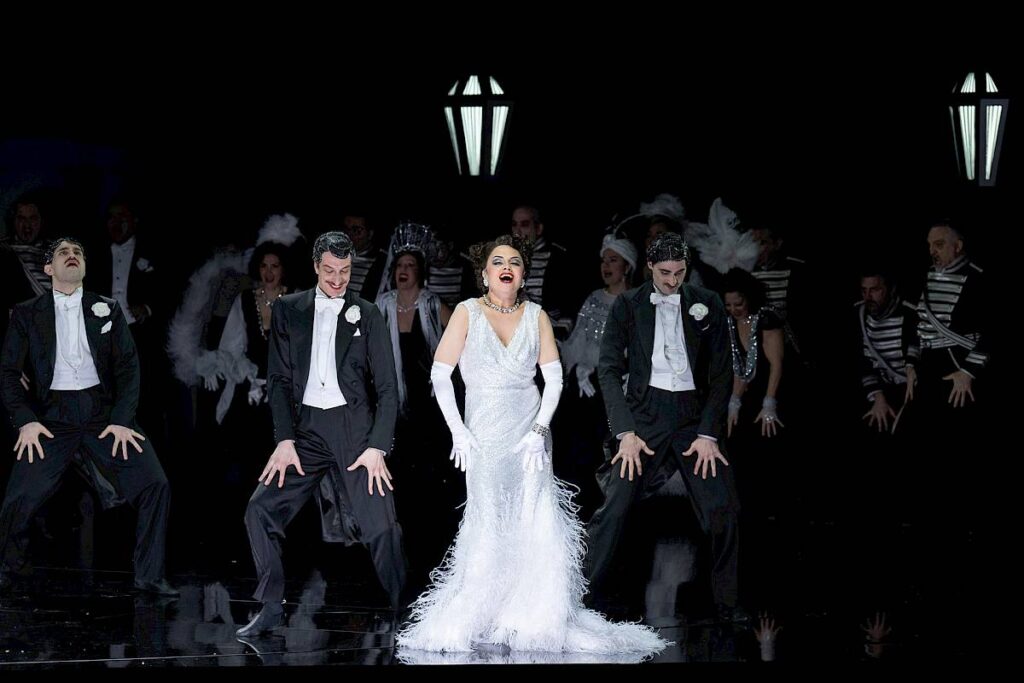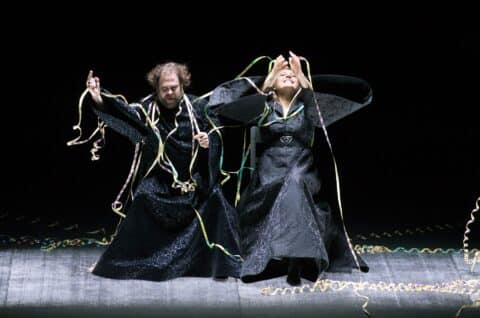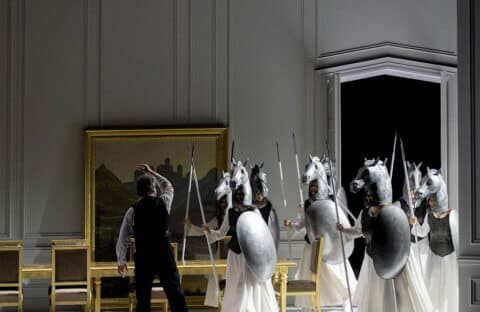THE MERRY WIDOW • ZURICH OPERA
★★★★☆☆

Photo: Monica Rittershaus
REVIEW DIE LUSTIGE WITWE THE MERRY WIDOW: UNBRIDLED BARRIE KOSKY GLAMOUR IN ZURICH
The Merry Widow goes to Hollywood in star director Barrie Kosky’s unabashedly glamorous production at Zurich Opera House, which entertains bravely despite a candyfloss-level content of highcultural vitamins.
The question is whether there’s enough sequins in the world to cover up how thin-boned a story Franz Lehar’s 1905 operetta really is. Even in the most blindly insistent, positive approach to the work, The Widow seems hopelessly old-fashioned. Kasper Holten and Adam Price were well aware of this when they made their successful, subtle, different take on the story at the Copenhagen Opera in 2021.
It feels like the operetta specialist Kosky, who rebooted the genre during his time at the Komische Oper in Berlin, has, in the same realization, chosen to cover this super banal rom-com with such a thick layer of festive costumes that the packaging has more substance than the content. A criticism that is not entirely new to the celebrated stage director.
It starts off promisingly with a beautiful, melancholic prologue where the widow sits alone on stage at a concert grand piano playing a medley of the show’s evergreen catchy tunes, all of which you’re guaranteed to recognize.
The music is supposedly a curious recording by Franz Lehar himself, preserved on a piano roll and available on You Tube.
Slowly, memories of the old world come to life as dancers step in and take over.
The men in tuxedos with moustaches, perfect pomade hair and carnations in the buttonhole, the women in tight-fitting, long silver sequin dresses with high slits, trimmed with white fur. Hey, what’s not to like!
The first act gets a little stuck in a strange way, with a little too much low comedy and a little too many banalities before the interval allows you to re-focus on the task at hand: I’m here to have a good time, and I don’t want to sit in the beautiful Zurich Opera House and be annoyed that an operetta that was hot in 1905 has cooled a lot since then.
Then with a shot of intermission bubbles, the mood quickly rises in the second act, where Kosky begins to play his strong hand of safe cards. The master of showbiz delivers a fireworks display of large-scale spectacular scenes that silence the critics.
The trump card falls around the Vilja-oh-Vilja-song, where a corps of male dancers go wild in black catsuits with emerald green glitter ornamentation in insect-like patterns. A magnificent queer naughtiness that makes the audience’s jaw drop in one of the best scenes of the show.
Soon after, when the widow is wheeled in standing on the grand piano in a gigantic, wildly ornate Madonna-like robe, a bigger idea begins to materialize. Underneath the robe, she wears a sexy dominatrix costume that expresses Kosky’s intention behind the staging – to present her as a strong, independent, cosmopolitan, self-determining woman who matches the zeitgeist of 2024.
A Kosky extemporisation of the original character, who even in the subdued original version created wild hype about the show when it was released around the turn of the century and the definition of gender roles was different, to say the least.
The show ends by quoting its beginning in a deliciously mournful melancholic mood around the grand piano, which, along with a wistful solo violin, closes the ballet with a beautiful bow and a little tear. That’s how it should be done.
Kosky has handpicked the soloists from previous successful collaborations, including the marvellous German soprano Marlis Petersen (56) in the title role of Hanna Glawari.
Marlis Petersen was excellent as the Marchioness in Kosky’s Der Rosenkavalier, but unfortunately indisposed this evening and last minute doubled with a slightly less starry cast.
The highly regarded German baritone Michael Volle (63), who triumphed with Kosky In The Master Singers, seems a bit oddly cast for the male lead as the reluctant embassy secretary and grand charmer Danilo, and makes the love affair seem absolutely unbelievable – as does the entire plot.
Let’s just agree that The Widow is mostly a series of catchy songs with anorexic, thin dialogue that will not satisfy an intellectually ambitious audience.
The operetta genre is difficult, but also historically interesting because it is the link between classical opera and modern musicals.
And what’s wrong with some light, well-crafted entertainment in spectacular stage pictures executed at the highest professional level?
A great, but not unforgettable evening at the Zurich Opera House, which lands four stars from GOT TO SEE THIS.


![★★★★★☆ REVIEW IL TROVATORE: DEVILISHLY GOOD VERDI IN ZURICH iltrovatore_c_monikarittershaus_132[1]](https://detskuduse.dk/wp-content/uploads/2022/10/iltrovatore_c_monikarittershaus_1321-480x270.jpg)

